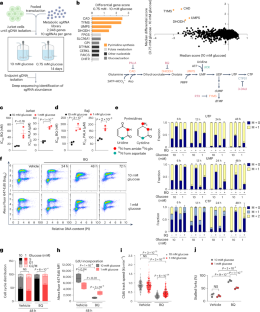Glucose limitation protects cancer cells from apoptosis induced by pyrimidine restriction and replication inhibition
IF 18.9
1区 医学
Q1 ENDOCRINOLOGY & METABOLISM
引用次数: 0
Abstract
Cancer cells often experience nutrient-limiting conditions because of their robust proliferation and inadequate tumour vasculature, which results in metabolic adaptation to sustain proliferation. Most cancer cells rapidly consume glucose, which is severely reduced in the nutrient-scarce tumour microenvironment. In CRISPR-based genetic screens to identify metabolic pathways influenced by glucose restriction, we find that tumour-relevant glucose concentrations (low glucose) protect cancer cells from inhibition of de novo pyrimidine biosynthesis, a pathway that is frequently targeted by chemotherapy. We identify two mechanisms to explain this result, which is observed broadly across cancer types. First, low glucose limits uridine-5-diphosphate-glucose synthesis, preserving pyrimidine nucleotide availability and thereby prolonging the time to replication fork stalling. Second, low glucose directly modulates apoptosis downstream of replication fork stalling by suppressing BAK activation and subsequent cytochrome c release, key events that activate caspase-9-dependent mitochondrial apoptosis. These results indicate that the low glucose levels frequently observed in tumours may limit the efficacy of specific chemotherapeutic agents, highlighting the importance of considering the effects of the tumour nutrient environment on cancer therapy. Nam et al. show that limited glucose availability similar to the tumour microenvironment confers resistance against chemotherapeutic drugs that target DNA synthesis.


葡萄糖限制可保护癌细胞免受嘧啶限制和复制抑制诱导的细胞凋亡的影响
癌细胞由于增殖旺盛和肿瘤血管不足,往往会经历营养限制条件,从而产生新陈代谢适应以维持增殖。大多数癌细胞会迅速消耗葡萄糖,而在营养匮乏的肿瘤微环境中,葡萄糖会严重减少。通过基于 CRISPR 的基因筛选来确定受葡萄糖限制影响的代谢途径,我们发现与肿瘤相关的葡萄糖浓度(低糖)能保护癌细胞免受新嘧啶生物合成的抑制,而新嘧啶生物合成是化疗经常针对的途径。我们确定了两种机制来解释这一结果,并在各种癌症类型中广泛观察到这一结果。首先,低血糖限制了尿苷-5-二磷酸-葡萄糖的合成,保持了嘧啶核苷酸的可用性,从而延长了复制叉停滞的时间。其次,低糖通过抑制 BAK 激活和随后的细胞色素 c 释放(激活 caspase-9 依赖性线粒体凋亡的关键事件),直接调节复制叉失速下游的细胞凋亡。这些结果表明,在肿瘤中经常观察到的低血糖水平可能会限制特定化疗药物的疗效,突出了考虑肿瘤营养环境对癌症治疗影响的重要性。
本文章由计算机程序翻译,如有差异,请以英文原文为准。
求助全文
约1分钟内获得全文
求助全文
来源期刊

Nature metabolism
ENDOCRINOLOGY & METABOLISM-
CiteScore
27.50
自引率
2.40%
发文量
170
期刊介绍:
Nature Metabolism is a peer-reviewed scientific journal that covers a broad range of topics in metabolism research. It aims to advance the understanding of metabolic and homeostatic processes at a cellular and physiological level. The journal publishes research from various fields, including fundamental cell biology, basic biomedical and translational research, and integrative physiology. It focuses on how cellular metabolism affects cellular function, the physiology and homeostasis of organs and tissues, and the regulation of organismal energy homeostasis. It also investigates the molecular pathophysiology of metabolic diseases such as diabetes and obesity, as well as their treatment. Nature Metabolism follows the standards of other Nature-branded journals, with a dedicated team of professional editors, rigorous peer-review process, high standards of copy-editing and production, swift publication, and editorial independence. The journal has a high impact factor, has a certain influence in the international area, and is deeply concerned and cited by the majority of scholars.
 求助内容:
求助内容: 应助结果提醒方式:
应助结果提醒方式:


